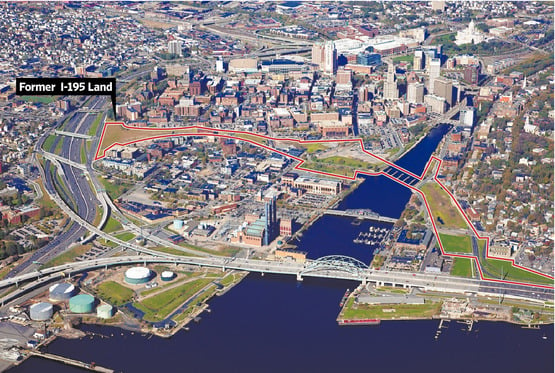Providence relocated a one-mile strip of I-195 because of concerns about congestion and traffic safety.Photo illustration by The Wall Street Journal; The LINK (photo)
During the initial construction of the nation’s interstate highway system six decades ago, Providence, R.I., bulldozed properties and divided neighborhoods to make way for a route through its downtown.
Now planners are looking to put some of those neighborhoods back together. The relocation of a one-mile strip of Interstate 195 has opened up its previous path to real-estate development in a move watched by planners and other cities contemplating the futures of their aging expressways.
Last month, a state commission charged with the land’s redevelopment solicited plans from developers interested in building on any of 17 sites on 19 acres in the strip of the former highway, known as the Link project.
“We are basically putting pieces of the city back,” said Jan Brodie, executive director of the commission. “It is the next major step in the transformation of downtown Providence.” Real-estate services firm Jones Lang LaSalle Inc. is helping market the parcels.
Interstate highways like I-195 were built through many of America’s downtowns after World War II. Now half a century later, many of those structures need major repair or replacement, and some cities are taking the expensive step of relocating or removing the highways to make their downtowns more walkable and inviting.
“We’re taking cities and rebuilding them in an urban form, not taking a fundamentally suburban form of a freeway and imposing it on an urban grid,” said John Alschuler, chairman of real-estate and planning consultancy HR&A Advisors Inc.
The result can be the opening of strips of prime land with the potential to knit together neighborhoods separated by viaducts or sunken highways for decades.
Milwaukee in 2002 demolished a section of a highway north of its central business district that was long disliked by neighbors. Since then, developers have been building out 16 county-owned parcels on a thin stretch of land where the Park East Freeway stood. An Aloft hotel opened in 2009 and an apartment building is under construction.
Other cities have put parks and smaller roads in their place, a move that has helped boost real-estate values and sparked surrounding development.
San Francisco refurbished its tree-lined waterfront after its Embarcadero Freeway was demolished following a 1989 earthquake. It now is lined by new condo towers and low-slung apartment buildings. Boston has seen a similar effect on the site of its Big Dig project, where a strip of parks sits atop a highway that was moved underground.
Of course, highway relocation projects typically cost far more than the reclaimed land is worth. But they often are designed primarily to improve transportation. Economic development is a secondary consideration.
Such is the case in Providence, where the $620 million-plus relocation project was driven by concerns about congestion and traffic safety on a strip of highway that made a horseshoe through the city’s Jewelry District and the edge of the College Hill neighborhood. The new highway opened in 2009.
Officials at the state redevelopment organization overseeing the project haven’t put a price on the land, but said they expect to sell it for more than the $40 million it was recently valued at before zoning changes were made.
One hurdle is that office demand in Providence has long been sluggish, and vacancy rates persistently high. But demand appears stronger from apartment builders and institutions, including Brown University.
Housing developers are eyeing the land, too. Rhode Island builder Carpionato Properties Inc. has been working for months on a plan to build a $275 million mixed-use project with 563,000 square feet of apartments, retail, hotel and office space. “This parcel is a gateway parcel to the east side,” said Kelly Coates, a senior vice president at Carpionato.
Planners don’t want sites to languish in the hands of private developers. A developer has one year to start building before the state can revoke their sale, officials said. “It’s not meant to be land banking,” Ms. Brodie said.
